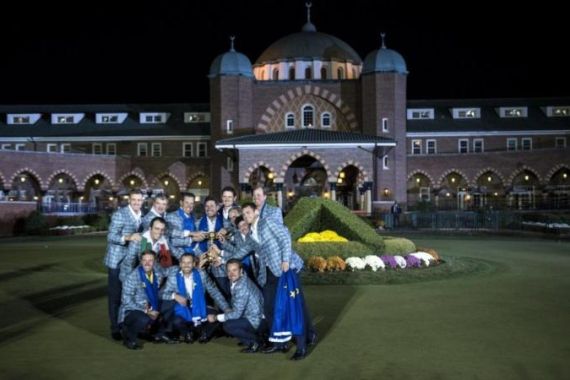Europe Tour struggles to compete with PGA bro
With bigger names opting for PGA tournaments and recession problems, there are concerns over future of European Tour.

The new 2012-13 season that starts this week may be something of a crossroads for a European Tour as it continues to lose its best players, struggle for sponsors and host events in its own backyard.
The cream of Europe’s golfing crop, including world number one Rory McIlroy and second-ranked Luke Donald, again plan to spend most of their time in the United States next year and will be joined by most of their triumphant Ryder Cup team mates.
Keep reading
list of 4 itemsScheffler becomes first back-to-back winner at golf’s ‘fifth major’
Rory McIlroy would consider playing LIV if it turns into ‘IPL of golf’
Jon Rahm jumps ship to LIV Golf in a stunning blow to the PGA Tour
Justin Rose, Ian Poulter, Sergio Garcia and Graeme McDowell have long since been based on the other side of the Atlantic but in 2013 they will also have Lee Westwood, Martin Kaymer, Nicolas Colsaerts and Peter Hanson for company.
“I think it’s been a slow progression for some people to base themselves in the States,” Poulter told reporters at the season-ending DP World Tour Championship in Dubai last month.
“It’s a tough situation for the European Tour because there’s not much money around and it’s very hard to convince sponsors to put big tournaments on. The tour need to work with the players on trying to find new sponsors.”
The top players will always compete for the European Tour’s biggest trophies, the four majors and the four WGC (World Golf Championship) events that are also co-sanctioned by the U.S. PGA Tour.
It is the lesser tournaments, such as the inaugural Nelson Mandela Championship in South Africa that starts on Thursday, they will miss and it is those type of events where it is proving more and more difficult to keep existing sponsors or attract new backers.
Less than half of the 45 tournaments on the 2012-13 European Tour are due to be played in mainland Europe where many countries are going through a recession.
“We are of course slightly disappointed we have lost events in the Eurozone countries,” said chief executive George O’Grady.
“The depth of that (Eurozone) crisis is very strong and I think we know if accountants are put in charge of the issue, the big thing is to cut costs wherever you can.”
O’Grady said there were several sponsor-less tournaments on the schedule that were now owned or promoted by the tour itself.
“That is a risk and reward situation,” he said.
“Sometimes we lose money and sometimes we win.”
Recession hit
O’Grady cited the Hong Kong Open, which is missing from the schedule for the first time since 2001 but will return for the 2013-14 season, as an example.
“We are the promoters of the Hong Kong Open and if you go back to May when we didn’t have a sponsor, we were looking at quite a significant hole in our profit and loss account,” he explained.
“In the end (Swiss bank) UBS came in and we got support. We are roughly breaking even on the tournament now.
“We also promote the Irish Open and the Scottish Open, which we invested quite a lot of money in this year and where we have a three-year deal.”
|
“We are facing a very unique feature of the European economy. It’s been a big challenge for us this year in Spain and we have kept the Italian Open going even though that country is not strong at the moment” European Tour chief George O’Grady |
The 2012-13 season features six tournaments in South Africa, six in the booming golf market of Asia and four in the Middle East but O’Grady said he was still keen to put on as many events as possible in mainland Europe.
“We want to keep the game strong in Europe,” he said.
“You can see the efforts we put on the structure of the game in each of those countries to bring new talent through.
“We are facing a very unique feature of the European economy. It’s been a big challenge for us this year in Spain and we have kept the Italian Open going even though that country is not strong at the moment.”
Spain was the jewel in the tour’s crown two years ago, with seven events on the calendar, but the country’s recent economic crisis has had a profound effect on top-level golf with sponsors disappearing and prize funds being withdrawn.
There were only three tournaments in the Iberian nation in 2012 and next season that figure will be down to one – the Spanish Open in April.
Chief operating officer Keith Waters, however, is confident the financial tide is about to turn for the tour.
“We have had a challenging year,” said Waters.
“We’re trying to readjust and we are also very aware there are more and more opportunities outside Europe.
“We’re in discussion with other tours as to how we can improve and address some of the challenges we have had in the last year but we are very hopeful we have seen the worst in terms of the recession.”